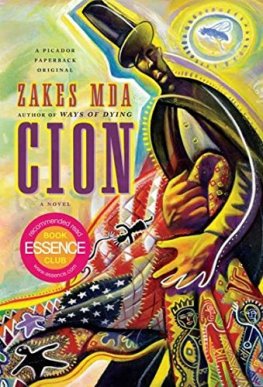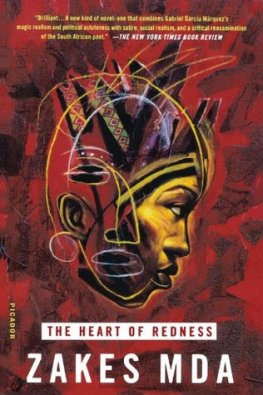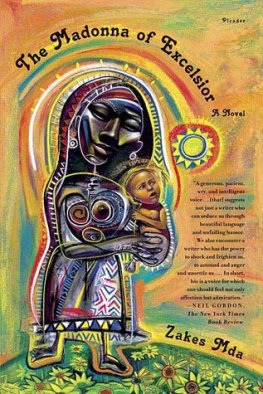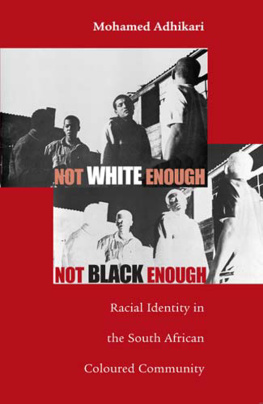Zakes Mda - Ways of Dying
Here you can read online Zakes Mda - Ways of Dying full text of the book (entire story) in english for free. Download pdf and epub, get meaning, cover and reviews about this ebook. year: 2002, publisher: Picador, genre: Prose. Description of the work, (preface) as well as reviews are available. Best literature library LitArk.com created for fans of good reading and offers a wide selection of genres:
Romance novel
Science fiction
Adventure
Detective
Science
History
Home and family
Prose
Art
Politics
Computer
Non-fiction
Religion
Business
Children
Humor
Choose a favorite category and find really read worthwhile books. Enjoy immersion in the world of imagination, feel the emotions of the characters or learn something new for yourself, make an fascinating discovery.
Ways of Dying: summary, description and annotation
We offer to read an annotation, description, summary or preface (depends on what the author of the book "Ways of Dying" wrote himself). If you haven't found the necessary information about the book — write in the comments, we will try to find it.
Ways of Dying — read online for free the complete book (whole text) full work
Below is the text of the book, divided by pages. System saving the place of the last page read, allows you to conveniently read the book "Ways of Dying" online for free, without having to search again every time where you left off. Put a bookmark, and you can go to the page where you finished reading at any time.
Font size:
Interval:
Bookmark:
Zakes Mda
Ways of Dying
1
There are many ways of dying! the Nurse shouts at us. Pain is etched in his voice, and rage has mapped his face. We listen in silence. This our brothers way is a way that has left us without words in our mouths. This little brother was our own child, and his death is more painful because it is of our own creation. It is not the first time that we bury little children. We bury them every day. But they are killed by the enemy. . those we are fighting against. This our little brother was killed by those who are fighting to free us!
We mumble. It is not for the Nurse to make such statements. His duty is to tell how this child saw his death, not to give ammunition to the enemy. Is he perhaps trying to push his own political agenda? But others feel that there is no way the Nurse can explain to the funeral crowd how we killed the little brother without parading our shame to the world. That the enemy will seize hold of this, and use it against us, is certainly not the Nurses fault. Like all good Nurses, he is going to be faithful to the facts.
Toloki belongs to the section of the crowd that believes strongly in the freedom of the Nurse to say it as he sees it. He has been to many funerals, and has developed admiration for those who are designated the Nurse at these rituals. They are the fortunate ones, those who were the last to see the deceased alive. Usually they are a fountain of fascinating information about ways of dying.
He moves forward a bit, for he wants to hear every word. The muttering about the Nurses indiscretion has become so loud that it is beginning to swallow his words of anger. Toloki thought he would need to elbow his way through the crowd, but people willingly move away from him. Why do people give way? he wonders. Is it perhaps out of respect for his black costume and top hat, which he wears at every funeral as a hallmark of his profession? But then why do they cover their noses and mouths with their hands as they retreat in blind panic, pushing those behind them? Maybe it is the beans he ate for breakfast. They say it helps if you put some sugar in them, and he had no sugar. Or maybe it is the fact that he has not bathed for a whole week, and the December sun has not been gentle. He has been too busy attending funerals to go to the beach to use the open showers that the swimmers use to rinse salt water from their bodies.
Merrie kressie, ou toppie, whispers a drunk, the only one who is not intimidated by whatever it is that people seem to fear from his presence. Merry Christmas, old man. Old man? He is only thirty-eight years old. He might even be younger than the drunk. It is the perfume, ou toppie. It is too strong. He hears a woman snigger. Why would anyone hate his sacred fragrance? It is the perfume that he splashes all over his body as part of the ritual of his profession before he goes to a funeral. On this fiery Christmas day, its strong smell is exacerbated by the stench of sweat, not only from his body, but from those in the crowd as well.
Toloki is now very close to the makeshift podium where the Nurse defiantly stands, but he still cannot hear a word he is trying to say. Some of us are heckling the Nurse. Some are heckling the hecklers. So, we do not hear one another. Toloki never thought he would live to see the day when a Nurse would be heckled. This is a sacrilege that has never been heard of before. And at the funeral of an innocent little boy, on a Christmas Day too.
Then he sees her, the mother of the boy. She is a convulsion of sobs, and is surrounded by women who try to comfort her. She lifts her eyes appealingly to the feuding crowd, and Toloki thinks he has seen those eyes before. But how can it be? He must approach and speak with her. Only then can he be sure. But people close around her and stop him.
I just want to speak with her.
We know who you are. You are Toloki the Professional Mourner. We do not need your services here. We have enough of our own mourners.
It is not on a professional basis that I want to see her. Please let me speak with her.
Ha! You think you are going to convince her behind our backs to engage your services? I can tell you we have no fees to pay a Professional Mourner. We can mourn just as well.
Who are these people, anyway, who wont let him see the woman he strongly suspects is from his home village? He learns that they are members of her street committee. They are determined to protect her from all those who want to harass her with questions about the death of her son. Newspaper reporters have been particularly keen to get close to her, to ask her silly questions such as what her views are on the sorry fact that her son was killed by his own people. They are keen to trap her into saying something damaging, so that they can have blazing headlines the next day. The street committee is always vigilant.
The Nurse cannot go on to tell us the story of the death of the deceased, this our little brother. The din is too loud. The church minister says a quick prayer. Spades and shovels eat into the mound of earth next to the grave, and soon the hole that will be the resting place of this our little brother forever more amen is filled up. Those nearest the grave sing a hymn, while a man with a shovel delicately shapes the smaller mound that has risen where the hole used to be. Wreaths are laid. Someone wants to know if the messages on the wreaths will not be read for the public as is customary, and in any case where are the relatives of this bereaved mother? She has no relatives, someone else shouts back. The street committee are her relatives. Then a procession led by the van that had brought the coffin to the graveyard is formed, in preparation for the solemn march back to the home of the mother of the deceased in the squatter camp, where we will wash our hands and feast on the food that has been prepared by the street committee.
Toloki decides that he will rush to the home of the deceased, wash his hands and disappear from the scene. He will have nothing to do with people who have treated him with so much disrespect. Hungry as he is, he will not partake of their food either. If he did not have so much reverence for funeral rituals, he would go home right away, without even washing his hands. People give way as he works his way to the head of the procession, which is already outside the gates of the cemetery. By the time he gets to the street, the procession has come to a standstill, and people are impatiently complaining about the heat. Others attempt to sing hymns, but their voices have gone hoarse from the graveyard feud. Those who can still come up with a feeble note or two are overwhelmed by blaring hooters in the street.
These come from a wedding procession of many cars and buses, all embellished with colourful ribbons and balloons. They are going in the opposite direction, and will not give way to the funeral procession. The funeral procession will not give way either, since out of respect for the dead, it is customary for funeral processions to have the right of way. The wedding party is enjoying the stalemate, and they sing at the top of their voices. Their heads, and sometimes half their colourfully clad bodies, appear from the windows of the cars and buses, and they beat the sides of these vehicles with their hands, creating a tumultuous rhythm. The driver of the convertible car in front, which carries the bride and the bridegroom, argues with the driver of the van which carries the mother of the dead child.
You must give way!
But we are a funeral procession.
We are a procession of beautiful people, and many posh cars and buses, while yours is an old skorokoro of a van, and hundreds of ragged souls on foot.
It is not my fault that these people are poor.
No one will budge. There might be a violent confrontation here, since the driver of the convertible, who is a huge fellow, is beginning to call certain parts of the van drivers mother that the slight van driver never even knew she had. Toloki walks to the convertible. He greets the bridal couple, and is about to give them a stern lecture on funeral etiquette, when the ill-humoured driver of the convertible suddenly decides that he will give way after all. He signals to the other drivers in the wedding procession to park on the side of the road so that the funeral procession can pass peacefully. Toloki smiles. He has this effect on people sometimes. Perhaps it is his fragrance. And the black costume and top hat of his profession. It cannot be that the driver of the convertible is intimidated by his size. He is quite short, in fact. But what he lacks in height he makes up for in breadth. He is quite stockily built, and his shoulders are wide enough to comfortably bear all the woes of bereavement. His yellow face is broad and almost flat, his pointed nose hovers over and dwarfs his small child-like mouth. His eyes are small, and have a permanently sorrowful look that is most effective when he musters up his famous graveside manner. Above his eyes rest thick eyebrows, like the hairy thithiboya caterpillar.
Font size:
Interval:
Bookmark:
Similar books «Ways of Dying»
Look at similar books to Ways of Dying. We have selected literature similar in name and meaning in the hope of providing readers with more options to find new, interesting, not yet read works.
Discussion, reviews of the book Ways of Dying and just readers' own opinions. Leave your comments, write what you think about the work, its meaning or the main characters. Specify what exactly you liked and what you didn't like, and why you think so.












